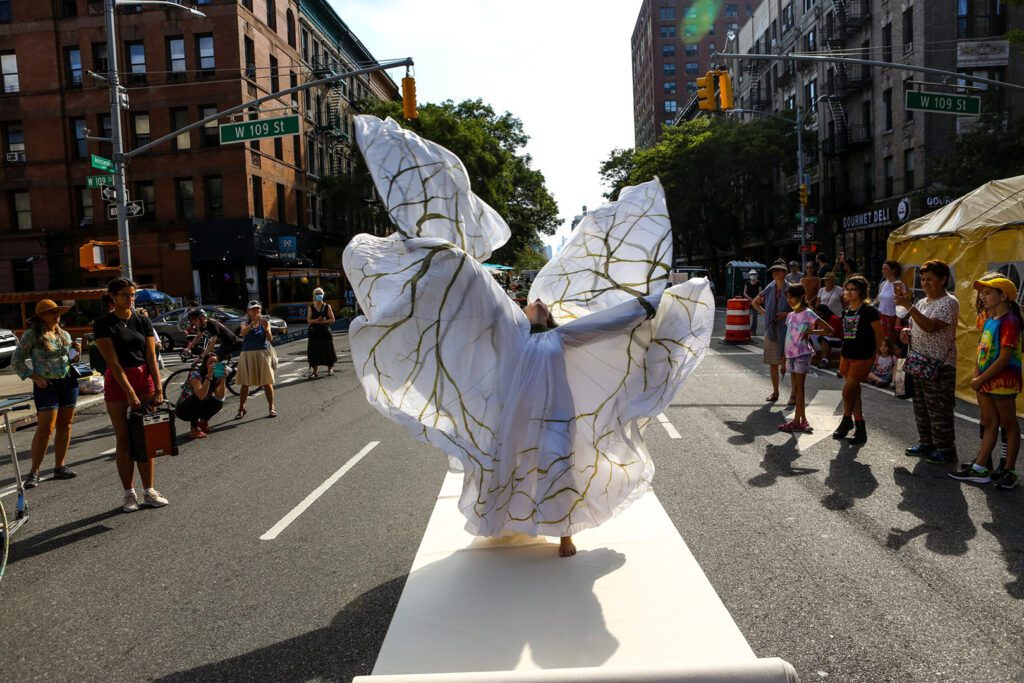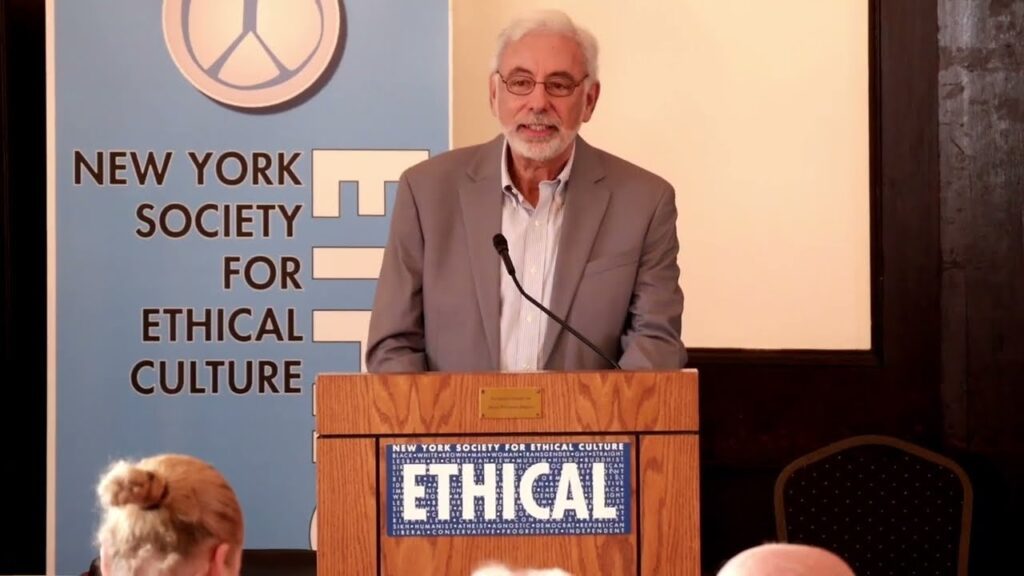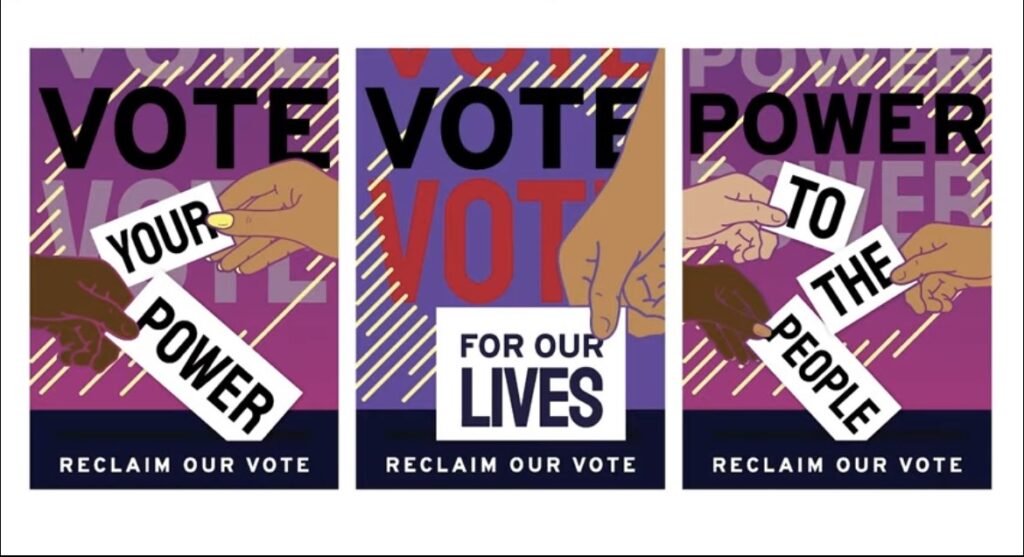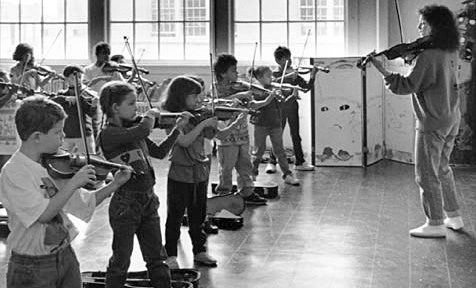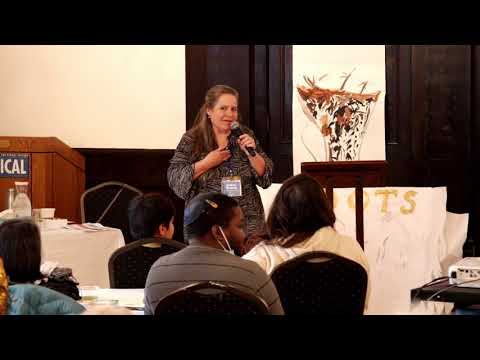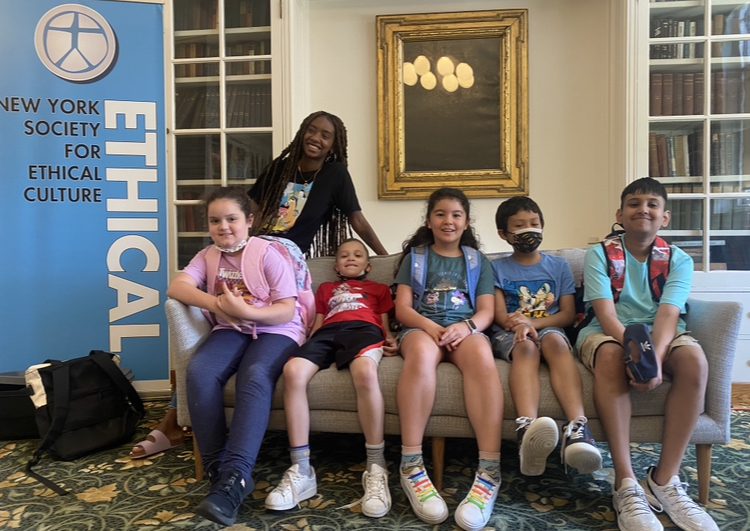
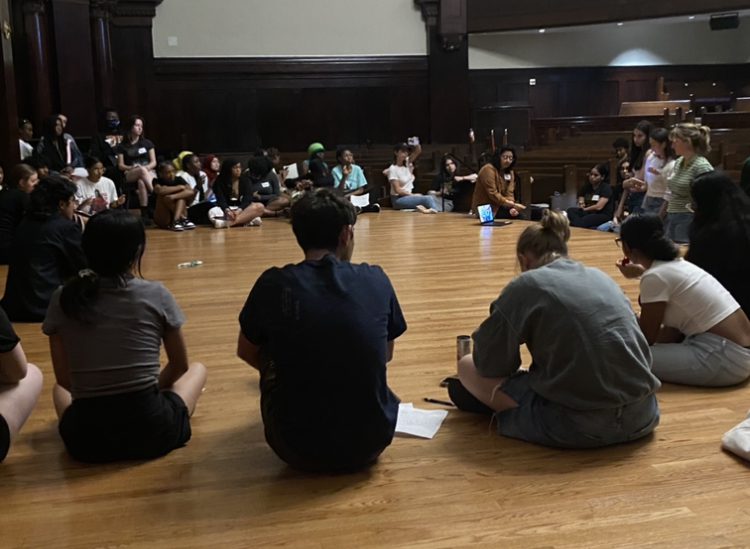
Ethical NYC’s building is a “COMMUNITREE” at work — nurturing many youth in their ethical development!
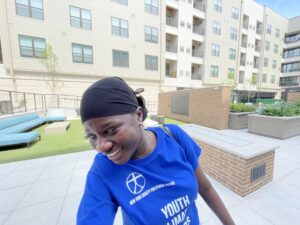 Youth from far and wide throughout our city have started their summer at Ethical, through three wonderful partner programs. Ethical members collaborated with staff to REACH OUT and grow our city’s ETHICAL WEB — much like the mycelium web, by which “the mother tree” nurtures the forest.
Youth from far and wide throughout our city have started their summer at Ethical, through three wonderful partner programs. Ethical members collaborated with staff to REACH OUT and grow our city’s ETHICAL WEB — much like the mycelium web, by which “the mother tree” nurtures the forest.
Ethical NYC has supported THREE wonderful youth initiatives: Democracy Camp, Writopia for Amsterdam Houses Children, and the new NYSEC Youth Conservation Corps!
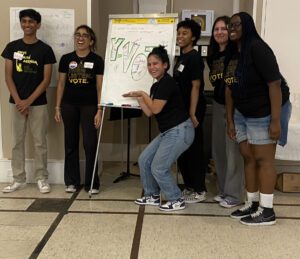 Here’s just a glimpse into these!
Here’s just a glimpse into these!
Democracy Camp brought 50 teens and 10 youth leaders in to do a deep dive into their own civic development. They arrived at Ethical NYC the hot minute they got out of their last day of school! They covered murals on every wall of Social Hall with their democracy ideas! NYSEC member Elinore Kaplan brought this project to NYSEC, having heard director Sanda Baladan speak in Social Hall at a luncheon of the League of Women Voters. Ethical Education organizer Audrey Kindred hosted, and NYSEC-YEE intern Helena Gelman offered a daily report.
(scroll down to read daily reports by Helena)
*****
Marlene Williamson of Ethical’s Social Service Board fostered a deep connection with Writopia, the kids writing club founded by Rebecca Wallace-Segal, to create: the Writopia Lab Amsterdam Houses Collaborative ~ offering opportunities for both Young Ethical Explorers ~ shout out to Rohan, Soorya & Samuel!~ and our good neighbors of NYCHA from the Amsterdam Houses! July 5-7, writing workshop leader Shanille Martin led a workshop in Adler Library with these wonderful children: Sheq, Ava, Isabella, Johnathan, and Ian. Shanille led a multi-genre creative writing workshop, where the group played writing games to spawn their creativity and chose individual topics for their stories. After, they got to go to the park.
Eleven year old Sheq of Amsterdam Houses took a particular interest in the meaning of Ethical, and after discussing this with Ms. Marlene, he offered Ethical NYC a wonderful new nickname:
The New York Society for Good Deeds!
When he found himself doing a good deed on the playground he announced:
“I feeeeel ethical!”

And on top of all that…
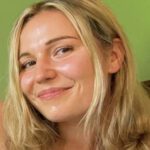
Meet Shauna
NYSEC’s Youth Climate Corps built its inaugural team of youth through a week of interviews at NYSEC, and an OSHA training. Thanks to the initiative of Ethical Member Monica Weiss, the guidance of the Bergen Society’s Ethical Leader Curt Collier, and the new NYSEC Corps leader, Shauna Ricketts, we have lots to look forward to as the summer unfolds. Shauna is passionate about environmental issues and has a background in documentary filmmaking and international education.
AND to plant a seed for future returns:
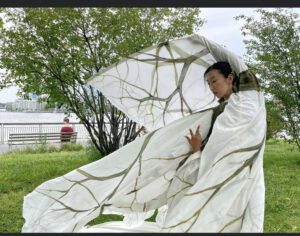 To all youth who have come to Ethical…. we welcome you back! To stay in touch with our programming, reach out to Akindred@nysec.org or YoungEthicalExplorers@gmail.com. We will be hosting fall programs for all ages, and reaching out to schools and families for wonderful events including: An inspiring Climate-Education Performance with Ethical NYC’s Eco-Artist in Residence Jody Sperling and her TimeLapse Dance
To all youth who have come to Ethical…. we welcome you back! To stay in touch with our programming, reach out to Akindred@nysec.org or YoungEthicalExplorers@gmail.com. We will be hosting fall programs for all ages, and reaching out to schools and families for wonderful events including: An inspiring Climate-Education Performance with Ethical NYC’s Eco-Artist in Residence Jody Sperling and her TimeLapse Dance
Thursday, November 16 at 10 am: FREE INVITATION FOR SCHOOL FIELD TRIPS. Performance with Q&A… including the option for in school workshops to prep or follow up. AND Friday, November 17 at 7 pm: A free public performance for community.
~~~~~~~~~~~~~~~~~~~~~~~~~~~~~~~~~~~~~~~~~~~~~~~~~~~~~~~~~~~~~~~~~~~~~~~~~~~~~~~~~~~~~~
 DEMOCRACY CAMP:
DEMOCRACY CAMP:
HERE IS A VISION into Democracy Camp
Daily reports by NYSEC-YEE intern Helena Gelman
Day 1 Tuesday Evening: Community Building
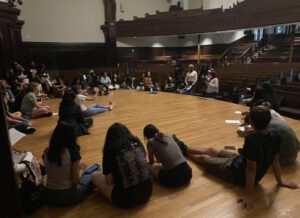 As campers trickled into the Ethical Culture basement, most of them fresh out of their last day of school, they were being asked to navigate and assess a brand-new environment full of brand-new faces. At least, unlike the first day in the cafeteria, they knew they would have somewhere welcoming to sit. Still, through the visual Sun and Clouds activity many of them freely expressed apprehension “about the amount of socialization there will be,” or how long it takes them to “get used to new people.” Campers tended to worry about how they would appear to their peers, as too “anxious” and “emotional,” “not being able to communicate my ideas thoroughly,” or “not understanding some concepts.”
As campers trickled into the Ethical Culture basement, most of them fresh out of their last day of school, they were being asked to navigate and assess a brand-new environment full of brand-new faces. At least, unlike the first day in the cafeteria, they knew they would have somewhere welcoming to sit. Still, through the visual Sun and Clouds activity many of them freely expressed apprehension “about the amount of socialization there will be,” or how long it takes them to “get used to new people.” Campers tended to worry about how they would appear to their peers, as too “anxious” and “emotional,” “not being able to communicate my ideas thoroughly,” or “not understanding some concepts.”
 However, everyone was keen to get started on speed-friending; “I learn most of my politics from conversations with other people,” one camper wrote. Topics discussed ranged wildly, from whether older people are blinded by a prejudice against immigrants to the best way to expand education about and access to municipal government, and from the youth’s prerogative to protest stagnant wages by sitting out on the workforce to whether turning eighteen actually made one feel like an adult. In this exercise, the campers got their first taste of actively building their own Community. The room worked together to define Community as a group cohered around a shared goal that listens to one another, trusts one another, pushes one another, and relates to one other “whether they like it or not.” And whether or not they realized it, with these generalizations the campers were vocalizing the ideals with which they would build their own space at Democracy Camp. Albeit only for four-and-a-half days.
However, everyone was keen to get started on speed-friending; “I learn most of my politics from conversations with other people,” one camper wrote. Topics discussed ranged wildly, from whether older people are blinded by a prejudice against immigrants to the best way to expand education about and access to municipal government, and from the youth’s prerogative to protest stagnant wages by sitting out on the workforce to whether turning eighteen actually made one feel like an adult. In this exercise, the campers got their first taste of actively building their own Community. The room worked together to define Community as a group cohered around a shared goal that listens to one another, trusts one another, pushes one another, and relates to one other “whether they like it or not.” And whether or not they realized it, with these generalizations the campers were vocalizing the ideals with which they would build their own space at Democracy Camp. Albeit only for four-and-a-half days.
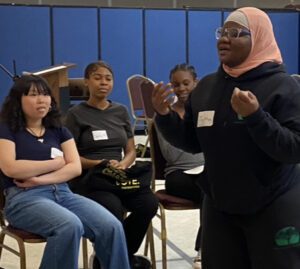 Day 2 Wednesday: Defining Democracy
Day 2 Wednesday: Defining Democracy
Assembling for the first full day of democracy camp, our attention was drawn to this prominently displayed James Baldwin quote: “American history is longer, larger, more varied, more beautiful, and more terrible than anything anyone has ever said about it.” Participants invited themselves to apply Baldwin’s succinct truth and nuance not only to their understanding of US history but also to the government that history has left us. Reflecting on such moments that came to mind as the Civil Rights Movement, Black Lives Matter, and Women’s Suffrage, campers coalesced around the idea that history shows the importance of effective, mindful yet specific messaging while expressing wariness about navigating the pitfalls of identity politics.
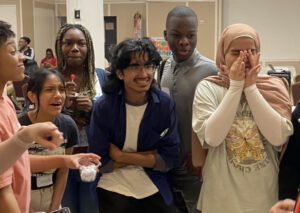 The contrast between the terrible and the beautiful provoked some expression of cynicism and distrust. While campers for the most part asserted their own faith in democracy and trust in elected officials, they were unsure whether their parents would feel the same. “People value wealth above everything,” explained one camper; she and many others believed that the majority of Americans would be happy to put their own well-being above that of the system. They also worried that they themselves could become “problematic” as they got older– one novel reason was a fear that the desensitizing power of social media’s 24-hour news cycle would diminish the importance of shock and moral outrage to provoke democratic involvement.
The contrast between the terrible and the beautiful provoked some expression of cynicism and distrust. While campers for the most part asserted their own faith in democracy and trust in elected officials, they were unsure whether their parents would feel the same. “People value wealth above everything,” explained one camper; she and many others believed that the majority of Americans would be happy to put their own well-being above that of the system. They also worried that they themselves could become “problematic” as they got older– one novel reason was a fear that the desensitizing power of social media’s 24-hour news cycle would diminish the importance of shock and moral outrage to provoke democratic involvement.
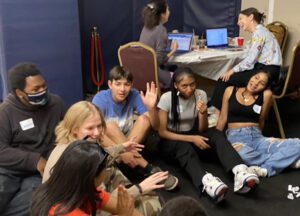 However, the session ended on a hopeful note, as participants reflected on the ways they could see participatory democracy in their own lives. They were eager to define what the variety of ways equitability can be implemented, and they did so recognizing the tension and necessity of pairing long-term solutions with (initially) small-scale engagement. One camper said she valued her time that day because “conversation made issues seem less black and white.”
However, the session ended on a hopeful note, as participants reflected on the ways they could see participatory democracy in their own lives. They were eager to define what the variety of ways equitability can be implemented, and they did so recognizing the tension and necessity of pairing long-term solutions with (initially) small-scale engagement. One camper said she valued her time that day because “conversation made issues seem less black and white.”
Day 3 Thursday: The media
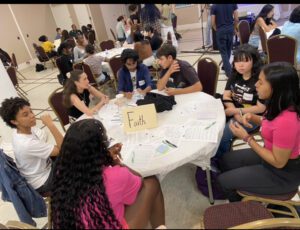 Thursday was devoted to recognizing and rationalizing political bias in the media. The campers built a Y-Vote Checklist to help them analyze the lean of the articles they would read that night, especially looking out for stylistic choices like inflammatory language, partisan buzzwords, and the representation of statistics.
Thursday was devoted to recognizing and rationalizing political bias in the media. The campers built a Y-Vote Checklist to help them analyze the lean of the articles they would read that night, especially looking out for stylistic choices like inflammatory language, partisan buzzwords, and the representation of statistics.
That afternoon they were arranged into a Human Barometer, creating a physical visualization of exactly how they felt on a variety of media ethics issues. Seeing their peers display their opinions with their bodies prompted engagement from a wide range of voices. Surprisingly, there was not overwhelming agreement on the 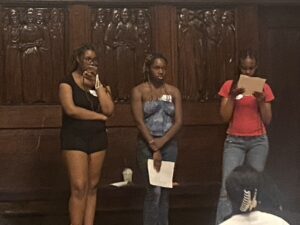 need for non-partisan media. Eashaan felt that the onus is on the public to seek out experts, and Unajoy that they should make their own conclusions from a variety of different perspectives. Emmanuel and Dawood pointed out the economic necessity of bias– that either the money has to come from an owner with his own perspective or from the attention of angered or righteously-indignant readers.
need for non-partisan media. Eashaan felt that the onus is on the public to seek out experts, and Unajoy that they should make their own conclusions from a variety of different perspectives. Emmanuel and Dawood pointed out the economic necessity of bias– that either the money has to come from an owner with his own perspective or from the attention of angered or righteously-indignant readers.
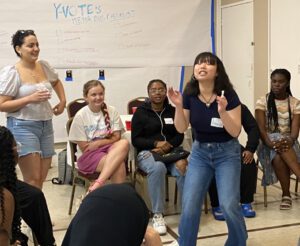 Anyway campers saw that even the driest piece of journalism has an angle– Amelia saw that the choice of what to include is inherently curatorial and Ruby pointed out that scholarship itself is conducted by people with purpose.
Anyway campers saw that even the driest piece of journalism has an angle– Amelia saw that the choice of what to include is inherently curatorial and Ruby pointed out that scholarship itself is conducted by people with purpose.
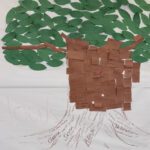 But maybe the real cause of misinformation is an inclination to be uncritical (Clementine). All these blasé attitudes about the necessity and negligible impact of media bias did not sit well with Emily M who, in one of her very few whole group contributions, was moved to ask her peers to consider the acts of mass violence that can stem from consumption of certain types of extremist media. Still, as the campers went back to their home-groups to start building the Democratree, there was consensus that, as Kelechi pointed out, it is a difficult line to walk for freedom of speech to be fully exercised and protected, while journalists are still incentivized to uphold civil political culture.
But maybe the real cause of misinformation is an inclination to be uncritical (Clementine). All these blasé attitudes about the necessity and negligible impact of media bias did not sit well with Emily M who, in one of her very few whole group contributions, was moved to ask her peers to consider the acts of mass violence that can stem from consumption of certain types of extremist media. Still, as the campers went back to their home-groups to start building the Democratree, there was consensus that, as Kelechi pointed out, it is a difficult line to walk for freedom of speech to be fully exercised and protected, while journalists are still incentivized to uphold civil political culture.
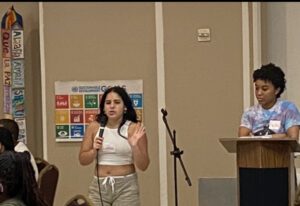
Day 4 Friday: A variety of things
As the campers began to coalesce around that interested them most, they were guided in activities that allowed them to seek out like minded peers. After participating in Youth Remix and Democracy Dilemmas they had a better idea of not only what they would like to focus their Democracy Projects on, but also with whom they would like to work.
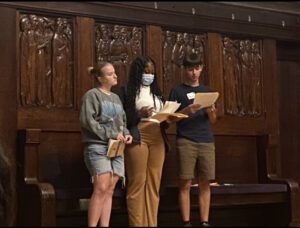 Something that stood out as an unlikely popular topic of discussion across these two activities was legislative power dynamics. Campers disagreed over the legitimacy of minority rights as theoretically protected in the Senate, with some saying that democracy favors the majority and others saying that democracy only merits the name if it allows as many people to participate as possible and minority rights encourages engagement. Both sides agreed that in either system it could be that the ideological majority is not in power (without any Falwell references.) However despite this possible silent consensus, the campers considered long-term legislative solutions largely impossible. A lack of national devotion or feeling of patriotic community one posited, but more commonly the political inviability of a legislative session that could not produce immediate change or the will of donors to consistently provide for work that might not benefit them was named as the culprit.
Something that stood out as an unlikely popular topic of discussion across these two activities was legislative power dynamics. Campers disagreed over the legitimacy of minority rights as theoretically protected in the Senate, with some saying that democracy favors the majority and others saying that democracy only merits the name if it allows as many people to participate as possible and minority rights encourages engagement. Both sides agreed that in either system it could be that the ideological majority is not in power (without any Falwell references.) However despite this possible silent consensus, the campers considered long-term legislative solutions largely impossible. A lack of national devotion or feeling of patriotic community one posited, but more commonly the political inviability of a legislative session that could not produce immediate change or the will of donors to consistently provide for work that might not benefit them was named as the culprit.
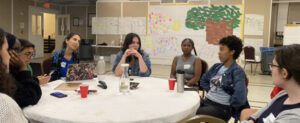 This dissatisfaction also surfaced in the Comparative Democracy activity, in which the campers had self-sorted to research a foreign country. The discussion group that combined the Singapore, Australia, and Russia trios expressed interest in the countries’ multiparty systems. They also all picked up on their stronger executive branches but not the implied risks, or at least not in a way that they found
This dissatisfaction also surfaced in the Comparative Democracy activity, in which the campers had self-sorted to research a foreign country. The discussion group that combined the Singapore, Australia, and Russia trios expressed interest in the countries’ multiparty systems. They also all picked up on their stronger executive branches but not the implied risks, or at least not in a way that they found 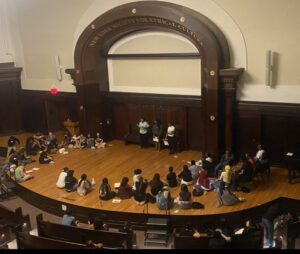 necessary to explain. Perhaps it was an oversight, but it is more optimistic to infer that the campers had gained enough confidence in themselves and their peers to feel that everyone around them would understand the aspects of American democracy worth preserving.
necessary to explain. Perhaps it was an oversight, but it is more optimistic to infer that the campers had gained enough confidence in themselves and their peers to feel that everyone around them would understand the aspects of American democracy worth preserving.
Day 5 Saturday: Wrapping up
The last day of camp was, like any “last,” bittersweet. All the participants were surprised to see how much they had bonded with each other. The Final Circle, so expertly handled by Jolina, gave them an appropriately communal space to share out their appreciation for the friends they had made and the camp itself. 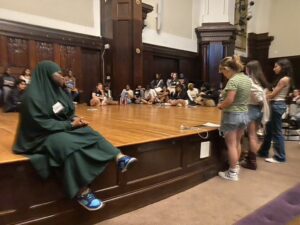 The one blank wall in the room was quickly filled with the well-wishes and signatures of the campers who had to be politely nudged out of Ethical Culture’s basement.
The one blank wall in the room was quickly filled with the well-wishes and signatures of the campers who had to be politely nudged out of Ethical Culture’s basement.
Luckily, nearly everyone had committed to completing a Democracy Project, to which this last day was dedicated, allowing the camp magic to be transformed into a tool for change in the “real world.” Fast friends committed to organizing lecture series, registration parties, and social media campaigns together. They tested their teamwork in the culminating activity where, tackling such diverse issues as ranked-choice voting and judicial term-limits, had to present to the entire camp a spectrum of possible opinions.
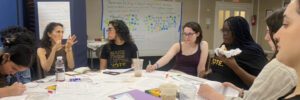 And of course, they also got hands-on political experience canvassing for Democracy Project data in Central Park and Columbus Circle. Campers came away from this experience with a sense of ownership over their Projects, connection with their team, and healthy frustration. This may have surfaced earlier during the hard conversations they had about abortion, the electoral college, and affirmative action, but now, attempting to poll city residents in midtown…
And of course, they also got hands-on political experience canvassing for Democracy Project data in Central Park and Columbus Circle. Campers came away from this experience with a sense of ownership over their Projects, connection with their team, and healthy frustration. This may have surfaced earlier during the hard conversations they had about abortion, the electoral college, and affirmative action, but now, attempting to poll city residents in midtown…
they could all cry in unison: “There are just so many tourists!”
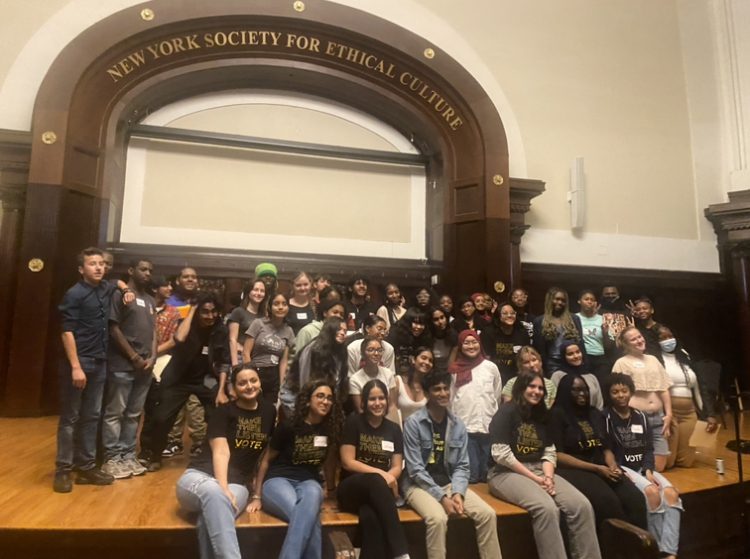
Democracy Campers 2023 at Ethical NYC!
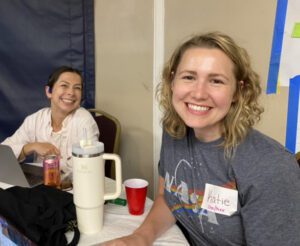 .
. 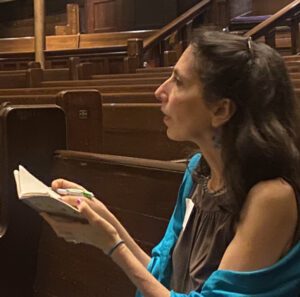
Democracy Camp’s Wonderful Staff: Erin, Katie, and founder/director Sanda Baladan.

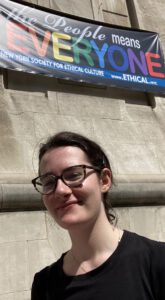 DEMOCRACY CAMP:
DEMOCRACY CAMP: 